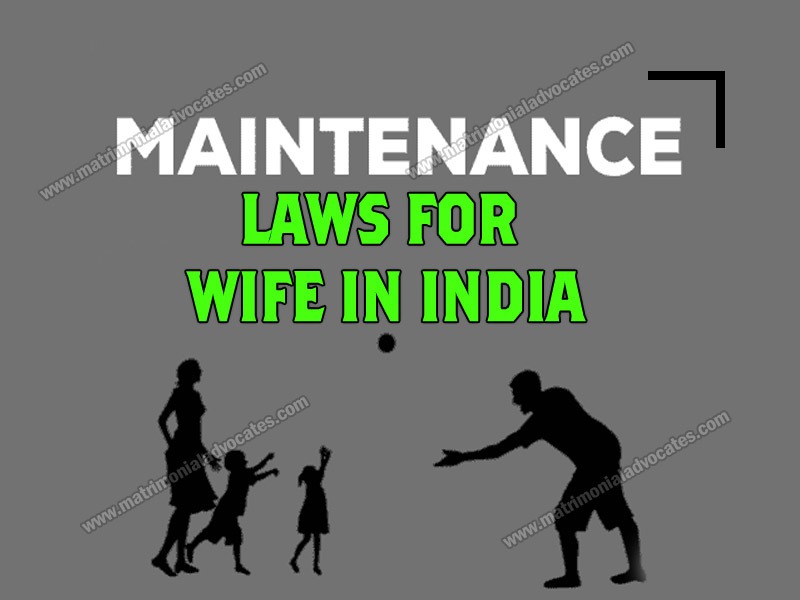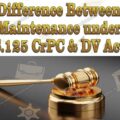
Maintenance is amount payable by the husband to his wife who is unable to maintain herself during the continuance of marriage or even after separation by obtaining a decree of divorce. It includes provisions for food, clothing, residence, medical attendance and treatment. The quantum of maintenance is either determined by the courts or can be mutually decided by the parties themselves. The quantum is determined keeping the above named factors in mind but is not just limited to it; the court also look into other factors such as education, standard of living, existence of children while determining the maintenance.
The Indian legal system has various personal and secular laws governing the law
of maintenance. They are:
- for Hindus – Hindu Marriage Act, 1955; Hindu Adoption and Maintenance Act, 1956
- for Muslims – Muslim Women (Protection of Rights on Divorce) Act, 1986
- for Parsis – Parsi Marriage and Divorce Act, 1936
- for Christians – Divorce Act, 1869
- secular laws – Criminal Procedure Code, 1973; Special Marriage Act,1954, Protection of Women from Domestic Violence Act,2005.
1. HINDUS
Hindu Marriage Act, 1955
A Hindu wife can claim maintenance from her husband u/s 24 and 25 of The Hindu Marriage Act. Section 24 of the Act deals with provision of interim maintenance whereas section 25 of the Act deals with permanent maintenance. Interim maintenance is paid to the wife to meet her expenses and to sustain herself during the litigation. Permanent maintenance is paid to a wife to bring her at power with the husband and to enable her to live a same lifestyle as she enjoyed in her matrimonial home. Section 25 of the Act states that the court can order the husband to pay maintenance to his wife in form of a lump sum or monthly amount for her lifetime. However, the wife may not be eligible for maintenance if there are any changes in her circumstances
Hindu Adoption and Maintenance Act, 1956
As per Section 18 of the HAMA, 1956 a Hindu wife is entitled to be maintained by her husband during her lifetime. Wife also has a right to separate residence and maintenance if any of the condition in Section 18(2)
[desertion, cruelty, leprosy, any other wife/ concubine living in the same
house, conversion of religion or any other reasonable cause]
is fulfilled until she remains chaste or does not convert to other religion. It may also be noted that Section 19 of this Act makes a provision for a widowed wife to be maintained by her father-in-law.
2. MUSLIMS
Muslim Women (Protection of Rights on Divorce) Act, 1986
Section 3, 4 & 5 of The Muslim Women (Protection
of Rights on Divorce) Act, 1986, deal with the captioned subject as to how to
secure maintenance for the Muslim wife & children through the Court of law.
Section 3 states that during the iddat
period, reasonable and fair maintenance has to be paid to the wife. Mehr agreed
at the time of marriage has to be given back. When the woman had to maintain
herself and her children, maintenance has to be paid for a period of 2 years.
If the child is born after the divorce, then the 2 year period
begins from the child’s date of birth. The amount of Mehr or dower agreed at
the time of marriage or after the marriage has to be paid to the wife. All
property was given to her by her relatives, friends or husband before, at the
time or after. Section 4 of the Act states that if the divorced Muslim woman is
unable to maintain herself after the period of iddat, the Magistrate can order
her relatives who will inherit her property, to pay maintenance to her as
deemed fit. When the children or relatives of the woman cannot pay maintenance
to her, the Magistrate can order the State Wakf Board established under the
Wakf Act, 1995 to pay her maintenance. Section
5 states that if on the date of the
first hearing of the application, a divorced woman and her former husband
declare, by affidavit or any other declaration in writing in such form as may
be prescribed, either jointly or separately, that they would prefer to be
governed by the provisions of sections 125 to 128 of the Code of Criminal
Procedure, 1973, and file such affidavit or declaration in the court hearing
the application, the Magistrate shall dispose of such application accordingly.
3. PARSIS
Parsi Marriage and Divorce Act, 1936
Section 39 and 40 of the Parsi Marriage and Divorce Act, 1936 deals with the provisions of interim and permanent maintenance to be provided to the wife. Interim maintenance is paid to the wife to meet her expenses and to sustain herself during the litigation. As per section 40 of the Act a Parsi husband or wife may apply to the Court under this section whereupon the Court at the time of passing any decree under the Act or anytime subsequent thereto order that the defendant pay the plaintiff a gross or monthly sum for his/her maintenance and support. Such order may also be modified subsequently if the Court is satisfied that change in circumstances warrants so. The order may also be rescinded or modified if the party in whose favour the order was made remarries; or in case of wife, she does not remain chaste; or in case of the husband, he has sexual intercourse with any woman outside the wedlock.
4. Christians
The Indian Divorce Act, 1869
Section 36, 37 and 38 of theIndian Divorce Act, 1869 contain provisions of maintenance to a Christian wife. Section 36 which deal with interim maintenance enables a wife to sustain herself and meet her expenses during the pendency of litigation. Section 37 of the Act empowers the district court to order the husband to secure a reasonable gross sum to the wife or annual sum not exceeding her lifetime when a decree of dissolution or decree or judicial separation is obtained by the wife. While passing such order, the court may have regard to fortune of the wife, ability of the husband and conduct of the parties. The court may also order the husband to pay such monthly or weekly sum to the wife for her maintenance as the court may think reasonable. If subsequently, the husband becomes unable to make such payments, the court may discharge or modify such order. Section 38 provides that the court may direct the payment of maintenance to even a trustee on behalf of the wife.
5. SECULAR LAWS
Criminal Procedure Code, 1973
Section 125 of the Code of Criminal Procedure contains the provision of maintenance. Under 125 CRPC if a wife is unable to maintain herself she can claim maintenance by filing an application to the magistrate. Under section 125 the term wife includes a divorced woman who has not remarried. The magistrate can, during the pendency of the proceeding under S.125 pass an order for interim maintenance to be paid monthly to the person unable to sustain themselves. The magistrate may also pass an order regarding the interim expenses of proceeding. However a wife who is living in adultery will not be entitled to maintenance. Section 127 of CRPC enables a wife to get her maintenance increased if there is a change in circumstances.
Special Marriage Act, 1954
Section 36 and 37 of the Special Marriage Act contains the provisions of interim and permanent maintenance to be provided to a wife who got married under the Special Marriage Act. Section 37 states that the maintenance may be claimed only by a wife against the husband from a court exercising jurisdiction under Chapters V or VI of the Act. An order made under this section may be modified or rescinded by the district court at the instance of the husband if it is shown that the wife has remarried or is not leading a chaste life.
Protection of Women from Domestic Violence Act, 2005
This is a special law which enables only those wives to claim maintenance from their husbands who have been subjected to Domestic Violence in their domestic relationships. It is not the maintenance per se that is granted by the court under the DV Act, it is the monetary relief which is granted to the aggrieved and such monetary relief may or may not include provision of maintenance.
Section 20 of the Domestic Violence
Act which deals with monetary relief contains the provision of maintenance. An
aggrieved women and her child can claim monetary relief from the respondent for
the losses suffered due to domestic violence. Such relief may include but is
not limited to:
a) the loss of earning;
b) the medical expenses;
c) loss caused due to destruction/damage/removal of any property in the control
of the aggrieved person;
d) maintenance for aggrieved person as well as her children including or in
addition to maintenance under S.125 CrPC or any other law.
On an application under S.23 of DV Act the magistrate can pass an order of interim maintenance during the pendency of the proceedings before it if it is satisfied that there is a prima facie case in favour of the aggrieved. The magistrate in such a case may also grant an ex parte order upon an affidavit of the aggrieved person against the respondent.





